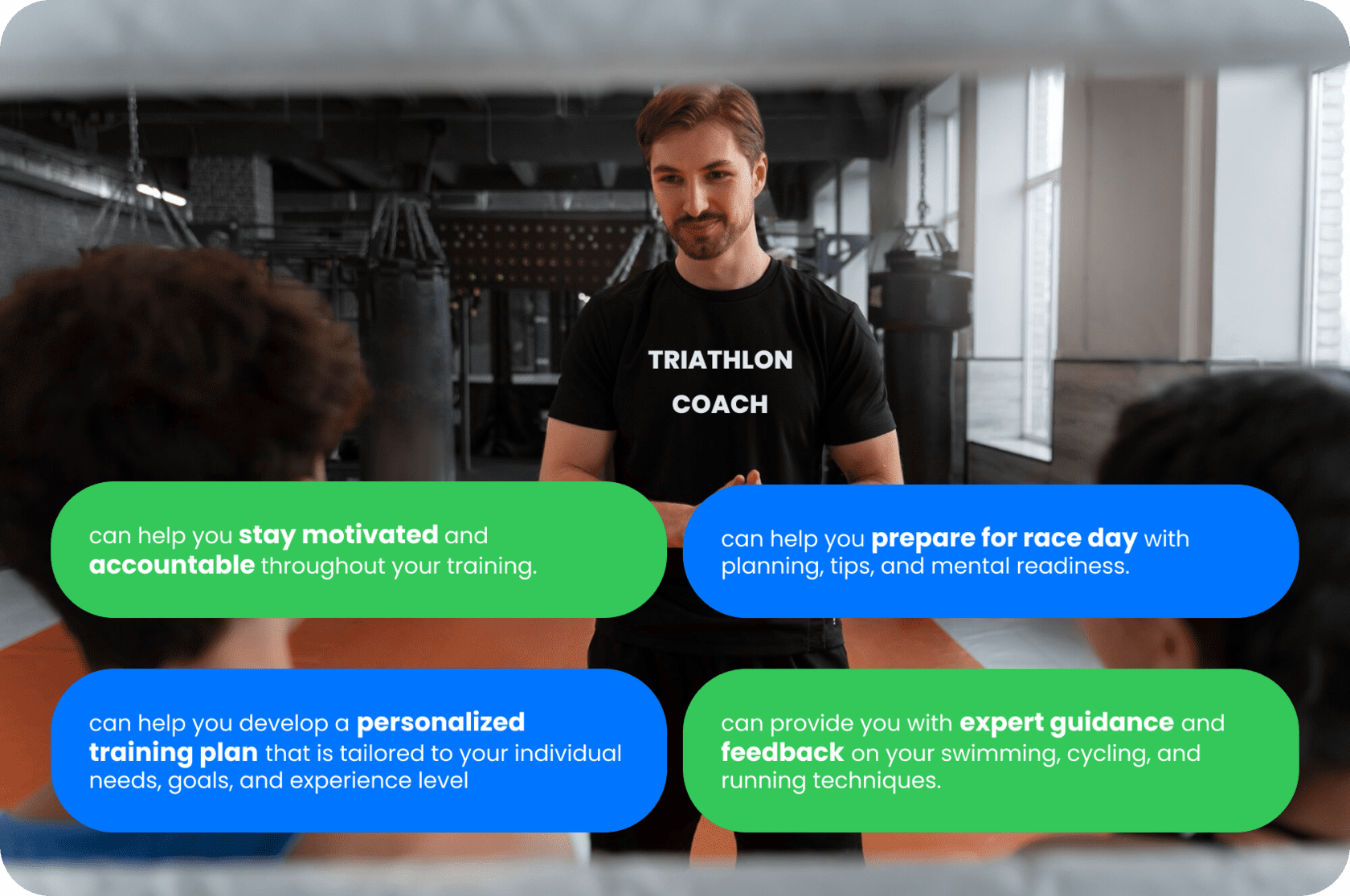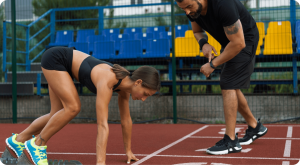Whether you are getting ready for your first Ironman race or your first-ever triathlon event, having a professional coach by your side is the key step to success.
Without a coach, it will be almost impossible to reach your goals, not to mention preparing properly for the race without harming your body.
I know what I am talking about because my coaches really helped me improve with every training session and push through my first Ironman race.
So, I thought I would share some tips on how to find a good triathlon coach.

What to Look For in a Triathlon Coach?
“The most effective triathlon coaching… integrates your entire life — sleep, stress, nutrition, and training — into a manageable plan. Seek a coach who understands that you are more than just an athlete.”
— Matt Dixon, Triathlon coach and founder of Purple Patch Fitness
I totally agree with this point. Your training must adapt to your life, not the other way around, and the right coach makes it possible to train for an Ironman with a full-time job.
Here are a few key things that can help a beginner triathlete find a triathlon coach who understands all the struggles athletes come through:
1. Check Their Experience
If you are a beginner, you may want to choose the best triathlon coach who has experience coaching beginners specifically.
And if you are training for a specific type of triathlon, such as an Ironman triathlon, you may want to choose a coach who has experience coaching athletes for that type of triathlon.
Also, ask the coach about their coaching methods. Make sure that you agree with their coaching methods and that you feel comfortable with their approach. A list of workouts is good, but you might need a flexible plan that will adapt to your life schedule.
2. Qualifications
A good triathlon coach should be certified by a reputable organization, such as USA Triathlon or the Triathlon Coaching Association.
This certification ensures that the coach has the necessary knowledge and skills to coach triathletes effectively. In addition to certification, you may also want to consider the coach’s education and training.
Do they have a degree in exercise science or a related field? Have they attended any coaching workshops or seminars? This will give you a deeper understanding of their coaching journey and whether it is something you are looking for.
3. Communication Skills
All the coaches should be able to communicate effectively with their athletes.
Here are some questions you can ask to assess the coach’s communication skills:
- How do you communicate with your athletes?
- How do you provide feedback: messages, phone calls, video calls, in-person conversations?
- How do you deal with challenges?
- How do you keep your athletes motivated?
Effective communication matters as much as the training program they create for you. It doesn’t necessarily mean in-person meetings, but that you connect regularly and clearly.
4. Personality
It is important to choose a triathlon coach who has a personality that is compatible with yours, especially if it comes to one-on-one coaching.
You need to trust your coach enough to be honest about your fatigue, stress, and fears. If your personalities don’t mesh, you might hide struggles. It prevents the coach from helping you effectively and can lead to injury or burnout.
In the end, triathlon training is a long journey. You are far more likely to stick with a plan and a coach you genuinely like and connect with.
How to Find a Triathlon Coach?
I always say that a triathlon coach is more than just a training plan provider.
They are elite athletes who serve as mentors, motivators, and sounding boards for your training and racing.
Here are a few tips to start your search with:
Identify Your Triathlon Goals
Carify your objectives. Are you aiming for a specific race distance, improving your training blocks performance, or simply enjoying the sport?
Know your goals to find a triathlon coach who aligns with your aspirations.
Use a Coach Match Service
If you do not have a local tri club in your area, you can use triathlon platforms like TriWorldHub to find a coach.
Our platform connects athletes with accredited coaches who meet your specific criteria. TriWorldHub is totally free to use for athletes. You pay your coach directly, no fees. Plus, we offer free tools that simplify your training and give the insights essential for your performance and motivation.
Consider Your Budget
Coaching fees vary.
Determine your budget and find a coach whose rates align with what you’re comfortable paying.
Remember that investing in a good coach can significantly impact your progress and results.
Interview Potential Coaches
Schedule interviews or consultations with potential coaches.
This is your chance to meet the coaches in person or over the phone and learn more about their coaching methods and philosophy.
Ask about their coaching philosophy, communication methods, and how they handle athlete feedback.
Here are some questions you might want to ask during the conversation:
- What is your coaching philosophy and approach to training triathletes?
- What qualifications and certifications do you have as a triathlon coach?
- Can you provide examples of successful athletes you’ve coached in the past, particularly those with goals similar to mine?
- How do you tailor training plans to accommodate athletes’ individual strengths, weaknesses, and schedules?
- What communication channels do you use to provide feedback and support? How often can I expect to hear from you?
- How do you handle adjustments to training plans in response to unexpected events, such as injuries or scheduling conflicts?
- What is your stance on triathlon nutrition approach and race-day fueling strategies, and do you provide guidance in these areas?
- How do you integrate cross-training, strength training, and recovery into your coaching plans?
- What technology or tools do you utilize to monitor athletes’ progress and performance?
- What is your availability for one-on-one coaching sessions or consultations, and how do you accommodate athletes who may have limited availability due to work or family commitments?
These questions should give you a good understanding of the coach’s approach, expertise, and compatibility with your needs as a triathlete

How Much Does a Triathlon Coach Cost?
Coaching fees can vary significantly depending on the coach’s qualifications, experience, reputation, and the level of personalized attention provided.
Typically, there are a few common fee structures:
1. Hourly Rates
Some coaches charge an hourly rate for their services, which can range from $50 to $150 per hour.
The total cost will depend on the number of hours required for coaching sessions and communication.
2. Monthly Packages
Many coaches offer monthly coaching packages, which often include a set number of training sessions, feedback, and support.
Monthly packages can range from $150 to $500 or more, depending on the coach’s expertise and the level of support provided.
3. Annual Plans
Coaches may offer annual coaching plans that provide long-term support and often come with cost savings.
These plans may range from $1,000 to $3,000 or more, depending on the coach’s reputation and the services included.
It’s important to have a transparent discussion with potential coaches about their fees and what is included in the coaching package.
This clarity will help you make an informed decision that aligns with your budget.
Red Flags When Choosing a Triathlon Coach
Choosing the right triathlon trainer is an important step in achieving your triathlon goals.
However, there might be a chance to run into a person who knows anything about triathlon training, exercise physiology, and race strategy.
It is important to be aware of the red flags so that you can avoid coaches who may not be a good fit for you.
Here are some of the red flags that you should watch out for:
1. Lack of Experience or Qualifications
A good triathlon coach should have experience coaching triathletes of all levels and be certified by a reputable organization, such as USA Triathlon or the Triathlon Coaching Association.
2. Unrealistic Promises
Be wary of coaches who promise you unrealistic results or who guarantee that you will finish your race or achieve a certain time. A good coach will be honest with you about what’s possible, not just tell you what you want to hear. For example, if they see that your cycling or swimming is bad, they will be honest and say something like, “Your swim form is holding you back. We need to dedicate two sessions a week to SWOLF and technique before we focus on speed.”
3. Lack of Communication Skills
A good triathlon coach should be able to communicate effectively with their athletes.
If at the beginning of your communication, you see that a coach is difficult to reach or does not respond to your questions or concerns in a time frame they promised, you might want to look for another one.
In triathlon training, the “my way or the highway” attitude is problematic. A good coach should adapt to your unique circumstances, goals, and preferences.
4. High-Pressure Sales Tactics
A good triathlon coach should not pressure you to sign a contract or pay for services you are uncomfortable with.
Be wary of coaches who use high-pressure sales tactics or who make you feel obligated to sign with them.
The main tip here that has almost never let me down in life is: trust your instincts. Sometimes, you feel that this is not what you are looking for, even if everything seems fine at first sight.

Summing up: How to Find a Coach to Become a Better Triathlete
Hiring the perfect triathlon coach is an important step in achieving your triathlon goals.
A good coach can help you develop a personalized training plan, improve your technique, stay motivated, and seamlessly integrate your training into your life schedule.
So, be sure to look for someone who has experience, qualifications, and communication skills. Also, ask questions about their coaching methods, expectations, and fees.
TriWorldHub is your reliable friend when it comes to choosing a great coach. If you are looking for a coach to help you get ready for your first-ever sprint triathlon or an Ironman, you can find the right person here.
Join TriWorldHub for free and connect with coaches and fellow athletes. Communicate, find free tools, select coaches, and improve your performance. All in one platform.





